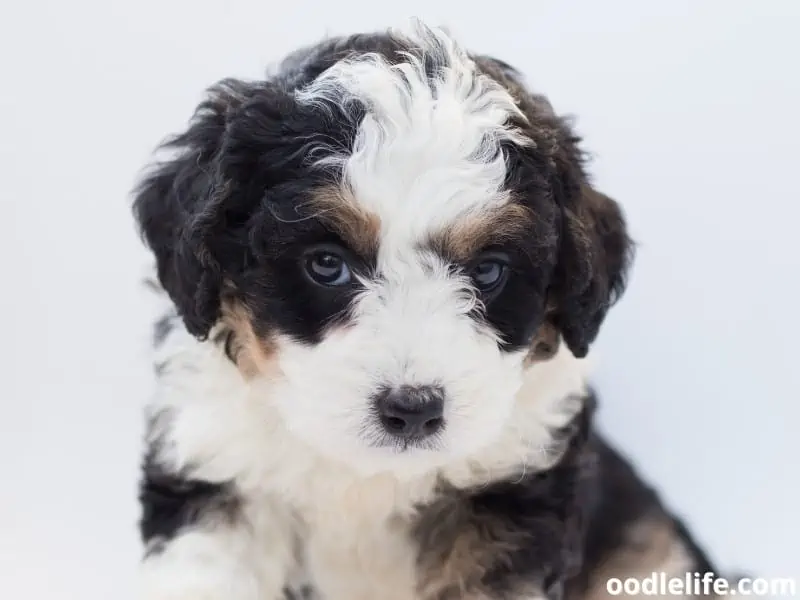Mini Bernedoodle Guide – 9 Things You Must Know
A cross between a Bernese Mountain Dog and a Poodle, the Bernedoodle makes a wonderful family dog. A Mini Bernedoodle is much smaller than the Standard-sized Bernedoodle but bigger than some Mini Doodle breeds. They may be produced by breeding a Standard Bernedoodle with a Mini Poodle.
A Mini Bernedoodle typically stands between 10 and 15 inches tall and weighs between 10 and 30 pounds.

Here are nine things you must know if you are a new proud owner of a Mini Bernedoodle or are planning on getting one.
1. They May Have A Stubborn Streak
Like most hybrids and mixed breed dogs, Bernedoodles inherit characteristics from both parent breeds. They are smart, playful, and friendly. However, the surroundings they grow up in and the training they receive also influence their temperaments.
Here are some traits most common among Mini Bernedoodles:
- One of the first things you will observe about a Mini Bernedoodle is that they are full of personality. You will find them vocal and clownish. Their vocalizations involve whining, barking, grumbles, growls, and the different sounds they make while arguing with their owner.
- While affectionate and loyal to their family, these curious beings want to explore everything around them even if they shouldn’t. They love to cuddle as they grow older and never disappoint when it comes to playing.
- As they love playing, you will find the puppies racing around the house or yard at full speed. However, you don’t have to worry, as this is classic puppy behavior. They will become calmer as they grow and their energy levels decline.
- However, the most common and consistent trait of a Mini Bernedoodle is its stubborn streak. They inherit this from their Bernese parents. You can easily tackle their stubbornness with proper training and patience. A light touch, positive reinforcement, and a treat as a reward for obedience generally do the trick.

2. They Shed
If you are looking for a dog that doesn’t shed, a Mini Bernedoodle is not for you. Unlike the parent breeds—the Poodle that barely sheds and the Bernese Mountain Dog that sheds a lot—the Bernedoodle is somewhere in between.
- Each Mini Bernedoodle has varying degrees of shedding, from moderate shedding to virtually no shedding.
- As a general rule, the more Poodle the dog is, the curlier the coat will be, and it will shed much less.
- The type of coat they inherit will determine the amount of shedding. They can have a curly, wavy, or straight coat and, at times, even an improper coat that is essentially a mix of coat types.
- The Mini Bernedoodle may or may not have furnishings. This refers to the long fur and beard that Doodles are noted for. The dog may either have short and straight hair on its face or long and curly hair. If the dog has a fluffy face, it indicates it is furnished and will have minimal to no shedding.
- Although some Mini Bernedoodles shed very little, they can still be a little allergenic due to the allergens present in saliva and dandruff.
3. They Need Their Daily Dose Of Exercise
Their daily exercise requirement will depend on their size and whether they take after their Bernese or Poodle parents. A Mini Bernedoodle that is more like a Miniature Poodle would have a lot of energy while one more like a Bernese Mountain Dog may be calmer.
- A standard-sized Mini will have an exercise requirement of between half an hour and two hours.
- The exercise can be in the form of walks in the yard or a park, usually twice daily.
- They love playing with other dogs. Playdates and visits to dog parks are favorites with Minis.
- As Mini Bernedoodle are active and social animals, incorporating exercise and mental stimulation works best for them. Snuffle mats and treat puzzles will entertain and exhaust their reserves of energy.
- The puppies have a higher energy requirement than their adult counterparts. However, they settle by the age of 6 to 8 months.
4. Their Grooming Needs Vary
Their grooming needs will depend on the type and length of their fur. The curlier the coat, the more their grooming requirements.
- The amount of time spent on combing and brushing will depend on the size of the dog, the coat type, and the length of the hair.
- A curly coat is more prone to matting, so you will need to brush and comb the fur daily.
- Just like human hair, the coat hair grows continuously. Longer hair is easily tangled, so you will need to trim it on a regular basis.
- You can groom your dog by yourself or hire a professional groomer. You should ideally learn to brush and comb them early because there will still be some shedding irrespective of the coat type.
5. They Are The Second Smartest Dog In The World And Easy To Train
Having a Poodle parent has certain benefits. It makes you one of the world’s brightest canines. Due to their high intelligence, Mini Bernedoodles are easily trainable.
Minis are highly food-motivated, according to most owners. Including treats in the training regimen yields incredible outcomes.
Due to their high intelligence, Mini Bernedoodles are easily bored, so you will need to utilize various training methods and approaches to keep training sessions fresh and fun. This ensures that the Mini is not bored and that you have their undivided attention during the session.
However, the dog is also known for its other characteristic, stubbornness, courtesy to its other parent Bernese Mountain Dog. Due to their stubborn temperament, they do not take punishments well, so you can only train them with positive reinforcement. To achieve better and faster results, it is important to be consistent and diligent with their training program.
Alternatively, you can opt for a potty-and-crate-trained puppy from your breeder at an additional cost.

6. They May Have Fewer Health Problems
Mini Bernedoodles are healthier than either of the parents.
Being a crossbreed, they exhibit what is known as hybrid vigor or heterosis. It describes the breed’s disposition to a different set of health problems than the parent breeds.
However, selective breeding programs are successful in eliminating many genetically inheritable diseases. They also ensure an increase in positive traits in the gene pool.
However, even with such selective and purposeful breeding, the crossbreed can still be predisposed to certain diseases and health issues.
While Minis are relatively healthier, they are still prone to inheriting diseases from their parent breed. However, the chances of developing these conditions decrease due to the presence of two different gene pools.
Some health issues your Mini may inherit from its Bernese Mountain Dog parent include:
- Cancer
- Sebaceous Adenitis
- Hip and elbow dysplasia
- Progressive Retinal Atrophy
- Epilepsy
- Heart Disease
- Von Willebrand’s Disease
- Patella
- Degenerative Myelopathy
- Macrothrombocytopenia
Some health issues your Mini may inherit from its Poodle parent include:
- Immune system diseases
- Juvenile renal disease
- Sebaceous adenitis
- Thyroid issues
- Bloat/torsion
- Skin problems
- Hip Dysplasia
- Eye problems
- Tracheal Collapse
The Poodle is generally healthier than the Bernese Mountain Dog and has a lifespan of 12 to 15 years as opposed to the Bernese Mountain Dog’s 6 to 8 years. As a Mini has more Poodle genes, it is generally healthier and has a lifespan equivalent to the Poodle’s, if not longer.
Although the Mini is healthier, it is always better to research the breeder and have the pet examined when you first bring it home.
If getting a Mini is on your bucket list, you can ask the breeder for certain test results and certifications as a precautionary step to avoid any issues later.
Some of them are:
- OFA (Orthopedic Foundation for Animals) certification for sound hips, elbows, eyes, patella luxation, and heart.
- Genetic testing for Von Willebrand Disease, Macrothrombocytopenia, and Sebaceous Adenitis.
A reputable breeder will not have any issue testing for the diseases and sharing the findings with you.

7. They Come In Many Sizes
Being a crossbreed, the size of a Mini Bernedoodle depends on the sizes of the parents. Although the Bernese Mountain Dog parent comes in a single size ranging from 20 to 23 inches, the Poodle comes in varying sizes: Toy, Miniature, and Standard. This results in Bernedoodles having a vast range of sizes.
Moreover, to attain Miniature sizes, the first generation (F1) Bernedoodle (50% Bernese Mountain Dog and 50% Poodle) is further bred with a Poodle (the resulting F2 generation is 25% Bernese Mountain Dog and 75% Poodle).
Depending on the size of the Poodle used for the breeding program, the size of the Mini Bernedoodle varies significantly.
While the Mini with more Poodle generally sheds less, the F1 generation Mini is much healthier.
8. They Suffer From Separation Anxiety
Whether working on the field or relaxing on the sofa, both the parent breeds are great companions. It is, therefore, no shocker that the Minis love being around their humans too. However, they seem to be more prone to separation anxiety issues than either of the parents.
They follow their owner from room to room all day long without tiring. They acquire this tendency to develop velcro-like bonding, and separation issues, from their Bernese parents. Crate training the puppy as early as possible will help them feel safe when no one is around.
You can opt for a trustworthy pet sitter if you intend to be away from home for more than a day.

9. They Change Color
Mini Berneoodles come in several colors like brown, black, white, and other mixes. However, the colors may fade as the Minis grow older. They are born with pink noses, which turn black as they mature.
Some Other Interesting Facts About Your Mini Bernedoodle
Some other interesting facts that you might like to know before bringing home a Mini Bernedoodle are:
- Mini Bernedoodles run hot and prefer to sleep on the floor rather than in their crate.
- They like to sleep on their backs. Sleeping on the back helps them cool off as the only sweat glands located in their paws are dangling in the air.
- They start losing their puppy teeth quickly once they are ready for their adult teeth. They may even lose two or more teeth at the same time.
- They are not fussy eaters and will eat just about anything you give them.
- A Mini Bernedoodle may cost you anywhere between $2000 and $6000.
- They are highly sociable and love being in a multi-dog family.
- They love to be outdoors, playing and running around.
Conclusion
The Mini Bernedoodle is a lovely dog breed that is loyal but has a stubborn streak—nothing that you cannot overcome with proper training.
They are also known as Velcro dogs as they form a strong attachment with their owners and do not do well when separated.
Their affectionate nature and fun personality make them fantastic pets.